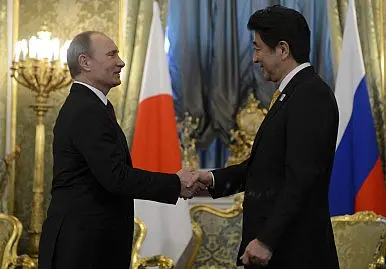Although icy relations between Russia and Japan show signs of warming after Friday's fence-mending visit by Japanese Prime Minister Shinzo Abe, territorial disputes will continue to cast a shadow over the rapprochement.
**Tepid exchanges
**
Abe and Russian President Vladimir Putin met in the Black Sea resort of Sochi and vowed to boost dialogue "in all directions -- political, economic, trade, investment and humanitarian," and maintaining close, high-level contact on various multilateral occasions.
But the lingering disputes between the two sides over four Pacific islands, known as the Northern Territories in Japan and the Southern Kurils in Russia, have seen little signs of improving after the talks. The Kremlin only said that "the issue was discussed in a very constructive way" without any further elaboration.Furthermore, the imposition of sanctions by Tokyo against
Moscow following similar measures by the United States and the European Union to punish Russia for its role in the Ukraine crisis, has made the bilateral relationship more complicated, as Putin's planned trip to Japan was postponed and high-level exchanges between the two sides stagnated.
Thanks to a string of diplomatic efforts to promote rapprochement, Japanese Foreign Minister Fumio Kishida finally visited Russia in September 2015, a tour originally scheduled in early 2014. The two sides agreed to resume consultations at vice ministerial level for the conclusion of a peace treaty.However, Abe did not specify in his visit whether his nation will lift the
sanctions against Russia, whose economy is struggling as a result of the sanctions and decreasing oil prices.Despite Japan's initiative gestures, the tepid exchanges between the two nations have proved that their long held territorial spats are still the main stumbling block and tipping point for bilateral ties.
Russia claims sovereignty over the four islands, which have great economic and military significance. Moscow has been urging Tokyo to discuss the issue within the context of World War II, while Japan maintains that Russia illegally occupied those islands.
According to the Soviet-Japanese Joint Declaration of 1956, Russia agreed to return two of the four islands after a bilateral peace treaty was signed, while Japan refused to sign such an agreement, insisting on the return of all four islands.
Two days before Abe's visit to Sochi, Kremlin spokesman Dmitry Peskov told reporters that Moscow expected "no immediate and serious progress" in the "extremely sensitive" territorial issue at the Putin-Abe meeting. Russian presidential aide Yuri Ushakove also said "it will take more time to find a final solution to the territorial spat."
Russian officials and experts said that the possibility for Russia-Japan rapprochement has also been dampened by efforts of the United States, Japan's military ally, to drive a wedge.
In a joint interview with Chinese, Japanese and Mongolian media in April, Russian Foreign Minister Sergei Lavrov candidly said that Japan "does not implement a completely independent foreign policy" and that Washington "does not approve the top-level contact between Russia and Japan."
Yuri Tavrovsky, professor with People's Friendship University of Russia, said: "Every attempt of Tokyo to establish at least a normal dialogue with Moscow has encountered with a covert and sometimes open U.S. resistance." Enditem
 简体中文
简体中文

